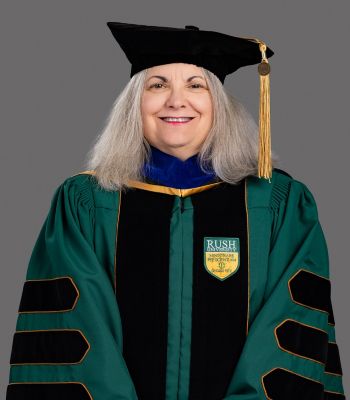Healthcare educator and avid Chicago Cubs fan Barbara A. Swanson, PhD, RN, will serve as university marshal at RUSH University’s 52nd Commencement Ceremony — one of the highest honors bestowed on a faculty member at RUSH for accomplishments in teaching, research, service and patient care.

Swanson is an associate dean for research in the College of Nursing. She also has worked as chair of the Department of Adult Health and Gerontological Nursing and director of the PhD in nursing science program. Her research career, with numerous grants and publications, has focused on clinical care and working with people living with HIV since 1987. She was named an associate editor for the Journal of the Association of Nurses in AIDS Care in 2016.
As university marshal, Swanson will lead the procession of faculty, graduating students and the president’s party. She will be the first academic official to enter the commencement hall and will carry the university’s mace. The mace symbolizes faculty’s authority and leadership to ensure graduates are competent, responsible and prepared.
We asked Swanson a few questions about education, the future of healthcare and advice for this year’s graduating class.
"Your critical thinking skills are more important than your knowledge. … Your education was intended to foster thinking, not retention of facts."
A Q&A with RUSH University 2024 University Marshal Barbara A. Swanson, PhD
How did you first decide that you wanted to become an educator, and how did that lead you to RUSH?
I was always interested in science and the mechanisms underlying clinical phenomena. I also had a strong desire to mentor the next generation of clinicians and scientists. A faculty role allowed me to merge those two interests. I chose RUSH because of its strong commitment to advancing clinical care through science. RUSH isn’t an ivory tower; it’s a clinical laboratory where discoveries are translated relatively quickly.
What excites you most about working with students?
The fact that I learn constantly from my students is what excites me most about working with them. Frequently, students ask me questions using a lens that I never considered, and that stimulates and sustains my critical thinking abilities.
How do you hope the research you've been involved with will affect the future of healthcare?
I’ve conducted several clinical trials to test the safety and efficacy of over-the-counter dietary supplements to manage symptoms that are often refractory to conventional treatment approaches. While most of the trials didn’t demonstrate efficacy, the findings added to the scientific literature and provided additional data points for patients and clinicians considering supplements.
Speaking of the future of healthcare, I saw a recent video you made on the E-nose device inspired by dogs’ ability to smell diseases. Can you tell me a little more about it and how it helps patients?
The E-nose is a portable sensor device that provides information about the gases that are produced by microorganisms in the body, as well as human cells. We can measure gases in easily obtained specimens, such as breath or urine. And because we know that specific conditions and diseases are associated with unique gas profiles, the E-nose holds potential for point-of-care screening with referral of persons with suspicious findings for diagnostic testing.
What’s something you enjoy outside of healthcare and education?
I’m a huge baseball fan and love reading about the history of the game and its players. I’ve traveled across the country to see games at different ballparks. Go Cubs!
What is one piece of advice you have for students graduating in 2024 as they start working in healthcare?
Your critical thinking skills are more important than your knowledge. Healthcare knowledge has a short half-life and quickly becomes obsolete. The best way to stay relevant in the face of rapid discoveries, which are constantly accelerating, is to recognize that your education was intended to foster thinking, not retention of facts.
